Nvidia has been a significant player in the artificial intelligence (AI) revolution, especially following the public release of ChatGPT on November 30, 2022, which coincided with its market capitalization soaring from $345 billion to an impressive $4.2 trillion by July 25, 2025. This surge has positioned Nvidia as a bellwether for the AI sector’s vitality.
However, attention is turning toward Taiwan Semiconductor Manufacturing Company (TSMC), which could emerge as a more lucrative investment in the semiconductor field. TSMC’s potential is rooted in its ability to support the AI infrastructure that is beginning to emerge.
The AI narrative has evolved from a focus on advanced chipsets, particularly graphics processing units (GPUs), to the necessary infrastructure for the technologies that will drive their development. According to McKinsey & Company, investments in AI infrastructure could hit $6.7 trillion in the next five years, heavily favoring data center hardware.
This trend is further evidenced by major cloud players, such as Amazon, Microsoft, and Alphabet, along with Meta Platforms, allocating over $330 billion in capital expenditures this year to enhance their AI capabilities. The momentum in infrastructure spending not only benefits Nvidia but also opens avenues for TSMC and other chip manufacturers like Advanced Micro Devices (AMD) and Broadcom.
Unlike Nvidia and AMD, which are locked in competition for AI workload supremacy, TSMC operates as an agnostic chip manufacturer. It provides critical foundry and fabrication services, essentially supplying the ‘picks and shovels’ that competitors need to produce their chips.
Furthermore, TSMC’s relatively low forward price-to-earnings ratio of 25, contrasted with Nvidia’s 40, indicates significant growth potential that could unfold as more businesses harness AI across various sectors, including cloud computing and cybersecurity. Emerging areas such as autonomous driving and quantum computing are expected to further increase the demand for GPUs and data center capacity.
Given the evolving landscape, TSMC appears poised for a comparable growth moment to that of Nvidia, with its valuation expected to align more closely with its growth trajectory in the coming years. Analysts predict that TSMC could outperform Nvidia by 2030, making it an appealing prospect for long-term investors as both companies ride the wave of AI infrastructure development.
